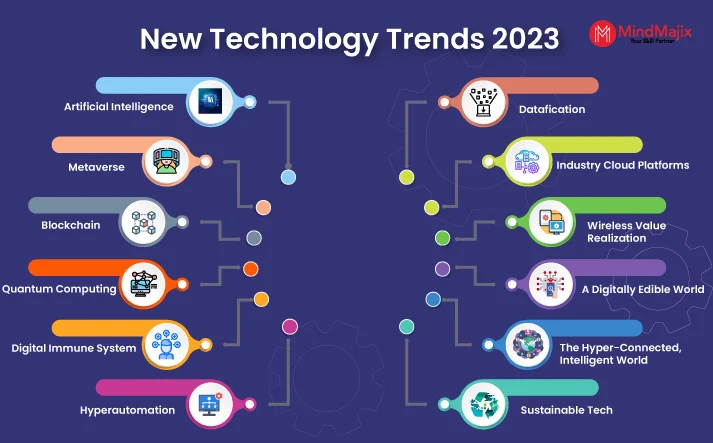Quantum Computing Revolution: How It Will Transform Industries in the Next Decade is a hot topic in the world of technology and business. Quantum computing has the potential to revolutionize various industries such as finance, healthcare, and cybersecurity by solving complex problems at an unprecedented speed. The development of quantum computing technology is expected to bring about significant changes in the way businesses operate and innovate.
The emergence of Quantum Computing Revolution will have a profound impact on the way businesses handle big data and perform complex calculations. This revolutionary technology is poised to disrupt traditional computing methods and pave the way for new advancements in fields such as machine learning, cryptography, and material science. As quantum computing continues to advance, it will open up new possibilities for solving problems that were once considered unsolvable, leading to groundbreaking innovations and advancements in various industries.
1. Introduction to Quantum Computing
Quantum computing is a revolutionary field that utilizes the principles of quantum mechanics to process and store information in quantum bits, or qubits. Unlike classical computers, which use bits to represent either a 0 or a 1, qubits can exist in a state of superposition, representing both 0 and 1 simultaneously. This property allows quantum computers to perform complex calculations at an exponentially faster rate than classical computers.
Furthermore, quantum computers leverage the phenomenon of entanglement, where the state of one qubit is dependent on the state of another, regardless of the distance between them. This enables quantum computers to solve certain types of problems, such as factorization and optimization, with unprecedented efficiency, making them potentially game-changing in various industries.
2. Quantum Computing’s Impact on Cybersecurity
Quantum computing poses a significant threat to current cryptographic methods, as it has the potential to break commonly used encryption algorithms, such as RSA and ECC, with its superior computing power. On the other hand, quantum cryptography offers new methods for secure communication, utilizing the principles of quantum mechanics to create unbreakable encryption keys. As quantum computing advances, the cybersecurity landscape will undergo a transformation, with a need for quantum-resistant encryption and communication protocols.
Moreover, quantum computing can enhance cybersecurity measures by rapidly analyzing vast amounts of data to identify and mitigate potential threats. The ability to process and analyze complex data sets at an unprecedented speed will strengthen cybersecurity defenses and enable proactive threat detection and response.
3. Quantum Computing’s Role in Drug Discovery and Healthcare
Quantum computing has the potential to revolutionize drug discovery and development by significantly accelerating the process of simulating molecular interactions and identifying potential drug candidates. With its ability to model complex molecular structures and interactions, quantum computers can expedite the discovery of new drugs and optimize existing pharmaceutical compounds.
Additionally, quantum computing can advance personalized medicine by analyzing large-scale genomic and proteomic data sets to tailor medical treatments and therapies to individual patients. The computational power of quantum computers enables in-depth analysis of biological systems, leading to more precise diagnoses and targeted medical interventions.
4. Quantum Computing’s Impact on Financial Services
Quantum computing has the potential to revolutionize the financial services industry by optimizing portfolio management, risk assessment, and trading strategies. With its ability to process vast amounts of financial data and perform complex calculations, quantum computers can enhance predictive modeling and enable more accurate financial forecasting.
Furthermore, quantum computing can strengthen cybersecurity measures for financial institutions, protecting sensitive financial data and transactions through quantum-resistant encryption methods. The potential for quantum computing to disrupt traditional financial systems and processes is driving investment and research in this area.
5. Quantum Computing’s Implications for Materials Science and Engineering
Quantum computing can revolutionize materials science and engineering by simulating the behavior and properties of complex materials at the quantum level. This capability can accelerate the discovery of new materials with tailored properties for various applications, such as energy storage, electronics, and manufacturing.
Additionally, quantum computing can optimize the design and development of new materials, leading to breakthroughs in renewable energy technologies, advanced electronics, and high-performance materials. The ability to model and simulate materials at the quantum level will drive innovation and efficiency in the field of materials science and engineering.
6. Quantum Computing’s Influence on Supply Chain and Logistics
Quantum computing can optimize supply chain and logistics operations by analyzing vast amounts of data to streamline inventory management, route optimization, and demand forecasting. The ability to process complex, real-time data sets can improve the efficiency and resilience of supply chain networks, leading to cost savings and enhanced customer satisfaction.
Furthermore, quantum computing can address combinatorial optimization problems, such as the traveling salesman problem, to find the most efficient routes and scheduling solutions for logistics and transportation. The impact of quantum computing on supply chain and logistics management is poised to drive significant advancements in operational efficiency and resource allocation.
7. Quantum Computing’s Role in Artificial Intelligence and Machine Learning
Quantum computing has the potential to accelerate the development and optimization of machine learning algorithms by processing and analyzing large-scale data sets at an unprecedented speed. This capability can lead to more advanced AI models with enhanced predictive and decision-making abilities across various industries.
Additionally, quantum computing can address complex optimization problems inherent in machine learning, such as feature selection, hyperparameter tuning, and model training. The synergy between quantum computing and AI has the potential to drive innovation and breakthroughs in intelligent automation, predictive analytics, and cognitive computing.
8. Quantum Computing’s Impact on Weather Forecasting and Climate Modeling
Quantum computing can advance weather forecasting and climate modeling by simulating complex atmospheric and oceanic phenomena with unprecedented accuracy and detail. The ability to process vast amounts of environmental data and simulate intricate climate systems can lead to more accurate long-term weather predictions and climate projections.
Furthermore, quantum computing can contribute to addressing climate change challenges by enabling more precise modeling of environmental processes, such as carbon capture and sequestration, renewable energy integration, and ecological impact assessments. The potential for quantum computing to enhance our understanding of Earth’s complex systems is significant for climate science and environmental sustainability.
9. Quantum Computing’s Influence on Aerospace and Defense Technologies
Quantum computing can revolutionize aerospace and defense technologies by optimizing complex simulations, such as aerodynamic modeling, structural analysis, and mission planning. The ability to process and analyze vast amounts of data in real time can enhance the efficiency and performance of aerospace systems and defense capabilities.
Additionally, quantum computing can contribute to the development of advanced encryption methods and secure communication systems for military and defense applications. The integration of quantum computing into aerospace and defense technologies has the potential to drive innovation and advancement in national security and strategic capabilities.
10. Quantum Computing’s Potential for Societal and Ethical Considerations
Quantum computing raises important societal and ethical considerations, such as privacy, security, and access to advanced technologies. The potential impact of quantum computing on data privacy, encryption, and information security necessitates careful consideration and proactive measures to ensure responsible and ethical use of quantum technologies.
Furthermore, quantum computing has the potential to exacerbate existing societal inequalities, as access to quantum technologies and the expertise to leverage them may be limited to certain groups or organizations. Addressing these societal and ethical considerations is crucial for fostering equitable access, responsible innovation, and the ethical deployment of quantum computing for the benefit of society as a whole.
| Industry | Impact of Quantum Computing |
|---|---|
| Finance | Improved risk assessment and fraud detection with advanced algorithms. |
| Healthcare | Drug discovery, personalized medicine, and disease modeling at a much faster rate. |
| Logistics | Optimized route planning and supply chain management for efficiency. |
| Cybersecurity | Enhanced encryption and security protocols to protect sensitive data. |
| Energy | Revolutionized energy storage and renewable energy development. |
conclusıon
Quantum Computing Revolution: How It Will Transform Industries in the Next Decade konusu, gelecek on yılda kuantum bilgisayarların endüstriler üzerindeki dönüştürücü etkilerini ele almaktadır. Finans, sağlık, lojistik, Siber güvenlik ve enerji gibi endüstrilerde kuantum bilgisayarların gelişmiş algoritmaları sayesinde risk değerlendirmesi, ilaç keşfi, lojistik planlama, veri şifreleme ve enerji depolama gibi alanlarda büyük ilerlemeler kaydedilecektir.




